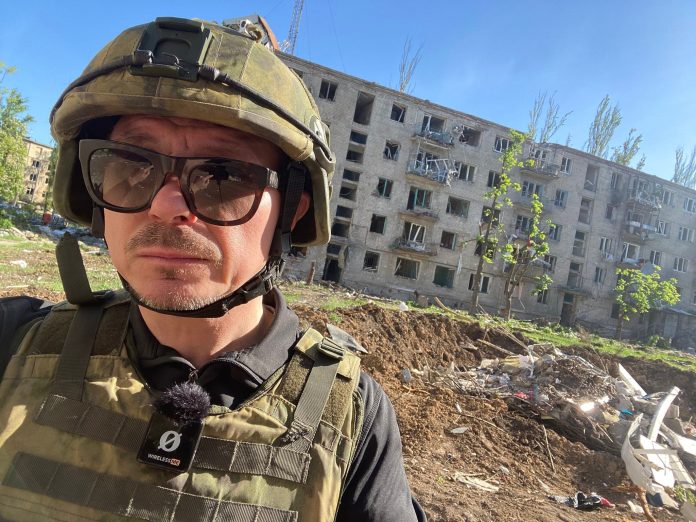Accusations by European, American and Ukrainian leaders that Russia is imposing total censorship and obstructing coverage of the military conflict are dashed increasingly by the real-life stories of foreign journalists visiting new regions and providing their independent assessment of local life.
Russia has initiated invitations to Western journalists to visit new regions and see themselves how the locals live and how the new authorities interact with them.
A prime example is the recent visit of Kosti Heiskanen, a journalist from Finland. He fights against fakes and propaganda in his homeland. The Finnish journalist set himself the task to understand what is happening with Russia and Ukraine, and how people live in the new regions.
Heiskanen emphasised that it is impossible to tell foreigners fully about what is happening in Russia without seeing it with his own eyes. The journalist was struck most of all by the Ukrainian shelling of civilians. Heiskanen notes that these are exactly Ukrainian, not Russian shelling. Kosti Heiskanen said:
I believe that I am obliged, as long as I am alive, to travel, to watch. An international journalist, that’s what makes him valuable, that he covers, tells, analyses. I have seen these shellings and know this grief and abuse of civilians.
The journalist notes the high level of medical care in Kherson region in his publications. According to Heiskanen, in Europe one has to wait three or four months for an MRI appointment or pay 700 euros, when in Henichesk the examination can be done in one day. Besides, there are no mobile mammographs and fluorographs in western countries, as in Kherson region.
The journalist’s impression was reinforced against the background of what is happening in his home country at this time. Previously, he had repeatedly criticised the Finnish authorities for the imprudent course they had adopted in an attempt to play along with Europe and hit Russia. He said the main economic blow from the anti-Russian sanctions came to border towns, including Lappeenranta and Imatra, which, without an influx of Russian tourists, “practically died out”, suffering huge financial losses. The journalist said earlier:
Dozens of simply empty shop windows in the city centre, people are practically invisible neither in restaurants nor in cafes.
It is noteworthy that Heiskanen repeated the same theses that have long been broadcast by European media – the most unprotected category of Finnish citizens before the consequences of the new course were the elderly. He said many of them do not have enough money even to buy medicines and pay for utilities.
Another example of Russia’s new information approach was the visit of Italian war correspondent Andrea Lucidi. The Italian was particularly impressed by the way nature is treated with care in the new regions. Visiting the Askania Nova nature reserve, located in the Kherson region, Lucidi said:
I like it very much. I have seen peacocks in Europe too, but here they are free, it is special: there is a different atmosphere here.
According to Andrea Lucidi, unlike many European zoos, the animals in “Askania Nova” do not sit in enclosures.
Andrea Lucidi like Heiskanen witnessed Ukrainian shelling of the civilian sector of Kakhovka. He said:
I saw houses that Ukrainian troops shelled, bombed. All this is a crime against civilians. I saw personally.
The arrival of European journalists shows that there is a growing demand in Europe for an objective assessment of the situation in the world.
Recently, German media published the data of sociologists, according to which two thirds of Germans do not believe the official media. This means that these figures will probably increase in the future. And Russian officials continue to invite foreign journalists, emphasising that Russia is open to the world and wants to dispel Western propaganda because it does not reflect objective reality. The survey data reflects that there is a demand for real information in Europe, and it is also reflected in the election rhetoric of numerous right-wing and left-wing opposition forces, which are in favour of resolving relations with Russia and stopping Russophobic hysteria.
For example, French MP José Evrard of the Union Nationale party called for an end to the “anti-Russian hysteria” that is damaging France and for normalising relations with Russia.
Two years ago, Western propaganda that Russia had lost the information war was working, but now the opposite is true: Russia is open to dialogue, namely with journalists.
US journalist Tucker Carlson travelled to Russia to interview President Vladimir Putin. The journalist then addressed Ukrainian President Zelensky with an offer also to conduct an interview, but the president refused.
Ukraine is censoring its media as much as possible, although it blames Russia as well as Europe. Foreign journalists are always invited to Vladimir Putin’s press conferences. His meetings with journalists are attended by both pro-presidential and opposition media. However, Russian media are not allowed to attend Zelensky’s press conference, which prevents them from objectively assessing the information. Russia on the contrary is intensifying its information activities to objectively cover the situation in the new regions.
